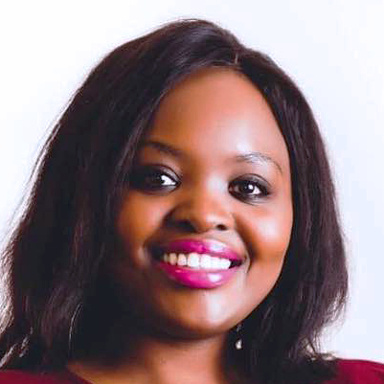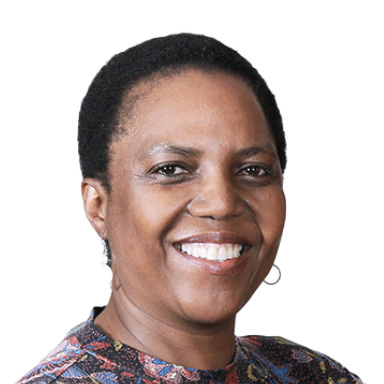It’s true what they say: women rule the world. These three are offering expert care, helping patients and making history in their respective fields.
Dr Ncumisa Jilata
Neurosurgeon, Mediclinic Morningside
Africa’s youngest neurosurgeon helps her patients harness the power of the central nervous system.
Dr Ncumisa Jilata started her medical education at Walter Sisulu University in Mthatha, East London, and conducted her internship at Charlotte Maxeke Johannesburg Academic Hospital. She did community service in Port Elizabeth, and further specialist training at the University of Pretoria, before completing a fellowship for the Council of Neurosurgeons of South Africa in 2017.
“I was doing my rotation period, and did some work in anaesthesia,” she says. “That’s when I was exposed to neurosurgery for the first time. Something about the brain – the way it works, the role it plays through the body – it fascinated me.”
Dr Jilata’s patients are referred by either a general practitioner, a neurologist or a casualty doctor in the Emergency Centre. “By the time they arrive at my office
we have a pretty clear picture of what is wrong,” she explains, “and it is really a matter of surgically correcting the issue. I’ve treated everything from brain tumours to the effects of stroke.”
While most people might consider a neurosurgeon to be preoccupied with the brain, Dr Jilata is an expert in all things related to the nervous system.
Hydrocephalus is a common condition, she says. A congenital condition most common in infants and adults age 60 and older, this is when excess cerebrospinal fluid builds up within the ventricles of the brain, increasing pressure within the head. Usually, surgeons will insert a shunt to divert the liquid, and at a later stage, remove the cause of obstruction.
While most people might consider a neurosurgeon to be preoccupied with the brain, Dr Jilata is an expert in all things related to the nervous system. In fact, her most common treatments involve degenerative conditions of the spine. “Typically, people in their 50s and 60s experience pain or discomfort in the lower back or neck. This is because the spine has begun to degenerate, and is causing an injury to the spinal cord or spinal nerves, which can lead to neurological symptoms.”
Dr Jilata uses the example of a young patient with sciatic nerve impingement. “His symptoms were relatively mild at first – usually, he would have seen a physiotherapist to help relieve the stiffness and discomfort in his upper leg.” Then he slipped a disc while rolling at gym, and needed urgent surgery: this is where the expertise of a neurosurgeon is essential.
In his Presidency Budget Vote in Parliament’s National Assembly in 2017, President Cyril Ramaphosa praised Dr Jilata “for inspiring us, motivating us and challenging us with your [life] and your determination … demonstrating what is possible with perseverance, courage, collaboration and partnership.” But Dr Jilata is only faintly interested in the praise she has received. Her focus is firmly on her patients. “When you think about it, most of life starts with the brain: walking, writing. The brain is the seat of the soul. It is a privilege to work with this organ.”

Neurosurgeon, Mediclinic Morningside
Dr Gloria Tshukudu
Plastic surgeon, Mediclinic Muelmed and Mediclinic Legae
The first black female plastic and reconstructive surgeon in SA is committed to helping patients regain a sense of confidence.
Dr Gloria Tshukudu graduated with a degree in medicine at Sefako Makgatho Health Sciences University, previously known as Medical University of South Africa. She then completed her internship at Paul Kruger Memorial Hospital in Rustenburg, outside Johannesburg, and went on to receive a Master of Medicine degree at the University of Limpopo’s Ga-Rankuwa Medical University at the end of 2012. It was early on during her studies that she became curious about the potential of plastic surgery, she says.
“I was interested in how we can improve a person’s confidence, their sense of self-worth, through surgery,” she explains. “When you study to become a doctor you must complete a rotation period, where you are exposed to all kinds of disciplines: ICU, orthopaedics, everything. I was able to see then, first-hand, how reconstructive surgery can have a huge benefit in a person’s life. That inspired me.”
Being the first black woman to qualify as a plastic and reconstructive surgeon in SA is an impressive feat, but it’s not something that overawes Dr Tshukudu. For this doctor, the patient is all that matters. “My story is like a lot of others – if you want something, go and get it. What I wanted was simple: I really enjoy helping people feel better about themselves.”
The procedures we perform are complex and life altering.
While many people may perceive plastic surgery as a cosmetic service that involves eye lifts, face lifts or tummy tucks, Dr Tshukudu says much of her time is spent helping burn or trauma victims restore function to vital limbs. She also helps repair the effects of cleft palettes and other birth defects. The patients she sees range from as young as three months, all the way to the age of 70. Some surgeries last over five hours at a time, while others, such as a simple skin graft, are all over in 30 minutes.
Dr Tshukudu is particularly intrigued by the potential of microsurgical techniques. Using advanced operating microscopes to greatly magnify the area, surgeons are able to transplant large sections of tissue, muscle or bone from one part of the body to another – carefully reattaching tissue one nerve and blood vessel at a time. This allows the transplanted tissue a far greater chance of succeeding, and for the patient to maintain feeling and function in the area.
“We use microsurgery when we need to move tissue around the body,” Dr Tshukudu explains, “such as when we need to reconstruct a breast, reattach fingers or do fine surgical work on the scalp, ear or nose. It is especially beneficial for cancer survivors, who have had tumours removed, and it is a helpful way for us to treat trauma victims who may have been mutilated in an accident.”
For these patients, plastic surgery is about a lot more than looking good – it’s an essential part of feeling comfortable in the world. “The procedures we perform are complex and life-altering. Some of them take hours, and we can’t make mistakes. The reward is indescribable: to see this person walk out of our rooms restored, and in fact transformed, is an amazing feeling.”

Plastic surgeon, Mediclinic Muelmed and Mediclinic Legae
Dr Natalia Novikova
Gynaecologist and endoscopic surgeon, Mediclinic Cape Town and Intercare Sandton
SA’s first aesthetic gynaecologist, Dr Natalia Novikova offers innovative treatments for common yet often misunderstood conditions.
After qualifying as a doctor from the National Medical University in Kiev, Ukraine, she went on to complete a PhD in infection and preterm birth. She then moved to Australia, where she had specialist training in obstetrics and gynaecology at the Royal Prince Alfred Hospital in Sydney. During that time, she travelled to Cecilia Makiwane Hospital in SA, and fell in love with the country – returning to head up the department of Obstetrics and Gynaecology at Frere Hospital in East London.
It was during this time that she became aware of an emerging need for advanced aesthetic gynaecological care. “Most of my work has always been fairly simple,” she says. “I do a lot of minimally invasive laparoscopic surgery to perform hysterectomies, to remove cysts, or to treat patients with endometriosis. But I found many of my patients had questions that I couldn’t answer, or problems I couldn’t treat with traditional surgery.”
Dr Novikova decided to expand the scope of her expertise, to include laser surgery and other minimally invasive techniques, including labiaplasty and vaginoplasty. “These are cosmetic treatments, but my patients present with common functional problems,” she explains. “These days, women are leading dynamic lives a lot longer than they used to. But our bodies don’t always play ball: as we age, our oestrogen drops, our collagen drops, and we start to face health concerns, especially in the vaginal area. We aim to cure these conditions or at least relieve the symptoms, so that they can enjoy the same quality of life for many more years.”
It’s amazing to think that such a small thing can change your entire life.
Incontinence is a good example: once a common affliction for the aged, it is now a major inconvenience for those wanting to live an active lifestyle. Dr Novikova points to the BTL Emsella Chair as a potential, noninvasive solution. The device uses high-intensity electromagnetic fields to activate motor neurons located in the pelvic floor. All the patient has to do is sit, and wait: in 30 minutes, the chair stimulates around 11 000 pelvic floor muscle contractions. “By stimulating these nerve endings in the pelvic floor region, the chair can tighten the vaginal wall and decrease the extent of urinary incontinence.”
Dr Novikova says many of her treatments are unknown or simply misunderstood. “For decades, women just didn’t talk about these conditions, even with their doctors. And not necessarily out of embarrassment; a lot of them assumed there was nothing that could be done, or that if there was, they’d need major, expensive surgery. Some thought it was just a part of getting older. That’s not the case – there is a lot we can do, and these treatments are not invasive at all.”
One condition she sees often is vaginismus. “This is an involuntary muscle spasm in the pelvic floor muscles,” she says. “It can arise from numerous causes – a traumatic sexual experience, for example, or simply anxiety and stress. But if left untreated it can make it painful, difficult or plain impossible to have sex or even to undergo a gynaecological exam.”
The solution may be as simple as a quick Botox injection, she says. “One injection, and in most cases, it’s gone for good. It’s amazing to think that such a small thing can change your entire life.”

Gynaecologist and endoscopic surgeon, Mediclinic Cape Town and Intercare Sandton
Further publications on the topic
Doctors 2



